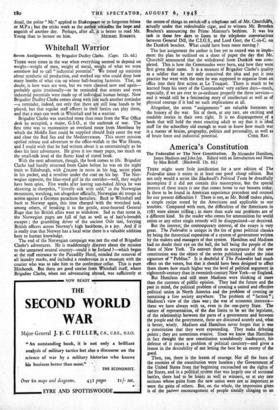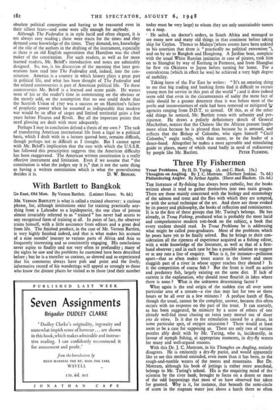America's Constitution
The Federalist or The New Constitution. By Alexander Hamilton, James Madison and John Jay. Edited with an Introduction and Notes by Max Beloff. (BlackwelL 12s. 6d.)
THERE might seem little justification for a new edition of The Federalist since it exists in at least one good cheap edition. But not only would a series like Blackwell's Political Texts be dreadfully incomplete if it did not contain this masterpiece, but the special interest of these tracts is one that comes home to our bosoms today. Is there to be found in American experience precedent and counsel for our present difficulties ? There is not, as Mr. Beloff makes plain, a simple recipe tested by the Americans and applicable to our troubles. Compared with ours, the difficulties of the Americans in 1787 were almost trifling ; in more than scale our problems are of a different kind. So the reader who comes for ammunition for world union or any other single remedy will be disappointed—or deceived.
But the interest; the contemporary interest, of the essays is very great. The Federalist is unique in the list of great political classics by being the theoretical exposition of a system of government written by the makers and managers of that system. Hamilton and Madison had no doubt their eye on the ball, the ball being the people of the State of New York. To convert them to acceptance of the new constitution was the object of the series published under the joint signature of " Publius." It is doubtful if The Federalist had much effect on the voters, but that it should have been designed to affect them shows how much higher was the level of political argument in eighteenth-century than in twentieth-century New York—or England.
But Hamilton and still more Madison were thinking of more than the currents of public opinion. They had the future and the past in mind, the political problem of creating a united and effective political union in North America and the problem of creating or sustaining a free society anywhere. The problem of "faction"; Madison's view of the class war ; the war of economic interests— these we have always with us, even in the one-party State. The nature of representation, of the due limits to be set the legislator, of the relationship between the parts of a government and between the people and the government, these are discussed acutely and, what is better, wisely. Madison and Hamilton never forgot that it was a constitution that they were expounding. They make debating points ; they are sometimes evasive. Since we know that Hamilton in fact thought the new constitution scandalously inadequate, his defence of it raises a problem of political casuistry—and gives a lesson in the desirability of not letting the best be an enemy of the good.
Then, too, there is the lesson of courage. Not all the fears of the enemies of the constitution were baseless • the Government of the United States from the beginning encroached on the rights of the States, and in a political system that was largely one of sectional battles, there had to be losers as well as winners, or at any rate sections whose gains from the new union were not as important as were the gains of others. But, on the whole, the impression given is of the patient encouragement of people timidly clinging to an
obsolete political conception and having to be reassured even in their silliest fears—and some were silly enough for anybody.
Although The Federalist is in style lucid and often elegant, it is not always easy reading ; these were tracts for the times and they demand some knowledge of the times. They demand, too, knowledge of the role of the authors in the drafting of the instrument, especially as there is an old English superstition that Hamilton was the chief maker of the constitution. For such readers, as well as for more learned readers, Mr. Beloff's introduction and notes are admirably designed. So, too, is his discussion of the meaning that later gen- erations have read into The Federalist and, indeed, into the con- stitution. America is a country in which history plays a great part in political life, and what has been thought of The Federalist and the related controversies is part of American political life. To these controversies Mr. Beloff is a learned and acute guide. He wastes none of his or the reader's time in commenting on the obvious or the merely odd, on the assumption that no one could doubt that the Scottish Union of 1707 was a success or on Hamilton's failure of prophetic power when he assumed as indisputable that modern war would be an affair of sieges and limited territorial gains a few years before Fleurus and Rivoli. But all the important points that need glossing are dealt with most adequately.
Perhaps I may in conclusion defend a thesis of my own ? The task of transferring American institutional life from a legal to a political basis, which I dealt with in a lecture quoted here, remains difficult, though perhaps not as difficult as I thought. But I cannot agree with Mr. Beloff's implication that the ease with which the U.S.S.R. has followed this prescription suggests that the American difficulty has been exaggerated. The American written constitution is a really effective instrument and limitation. Even if we assume that " the constitution is what the judges say it is," that it not the same thing as having a written constitution which is what the generalissimo



































 Previous page
Previous page